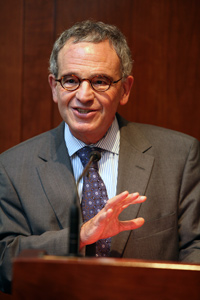
Photo by Bruce Gilbert
Fordham University marked the launch of its Consortium on Social Justice and Poverty on Sept. 22 with a discussion at its Lincoln Center campus on how the global downturn affects the world’s poor.
The event, which included a panel of economists and scholars, celebrated the links that will be formed between the University and institutions within and beyond New York City.
The intra-University effort unites faculty, students, administrators and staff in support of educational programs and service initiatives aimed at social justice and poverty issues. It will promote interdisciplinary scholarship and service opportunities within the Fordham community.
Sponsored by 19 University offices, organizations and student groups, the consortium is the result of nearly two years of planning, said Stephen Freedman, Ph.D., senior vice president/chief academic officer at Fordham.
“I know the importance of academic rigor and academic integrity as the central component of Jesuit education, but in my talks with students, faculty and staff this year and last, I stressed the social justice component,” Freedman said.
“Leading lives of service to others is a key component of what we do at Fordham University and throughout Jesuit higher education,” he said.
Freedman urged the faculty to bring aspects of research and teaching to bear on the issues of injustice. He asked staff and students to share news about the consortium with friends.
Robert J. Reilly, assistant dean for the Feerick Center for Social Justice at the Fordham School of Law and member of the consortium’s steering committee, said the consortium provides increased communication and better cooperation.
“There’s so much good work going on at Fordham, and this is a way for our faculty, staff, students and administrators to find out about the work that is being done, find each other and even work together,” Reilly said.
A key component of the effort is its website—www.fordham.edu/cosj—which will act as a database and search engine for experts, programs, events, volunteer opportunities and other Fordham resources related to social justice and poverty issues.
“The search engine is very comprehensive and useful. Not only does it connect people to the database, but it connects people to each other,” said Catherine Beuscher, Ph.D., coordinator for academic projects and processes.
A key part of the consortium’s launch year is its 2009-2010 service initiative, which aims to make an impression on the community.
Dora Galacatos, senior counsel at the Feerick Center, unveiled a plan to mentor people who are aging out of foster care.
“This group is at a particularly high risk for homelessness and many negative outcomes once they become emancipated,” Galacatos said. “Mentorship is one intervention that has been shown to make a difference and help young people better stabilize their lives and maintain independent living.”
The consortium is working with Good Shepherd, a Bronx-based youth development, education and family service agency. Volunteers will serve as group mentors who provide fellowship, friendship and hope.
“The entire effort will take only 16 hours from beginning to end, including training,” Galacatos said. “The Bronx has long been identified as the borough of highest need. It’s the place in the city where the greatest number of young people are who want a mentor and don’t have one. As a first step, we’re so pleased to announce this pilot effort.”
